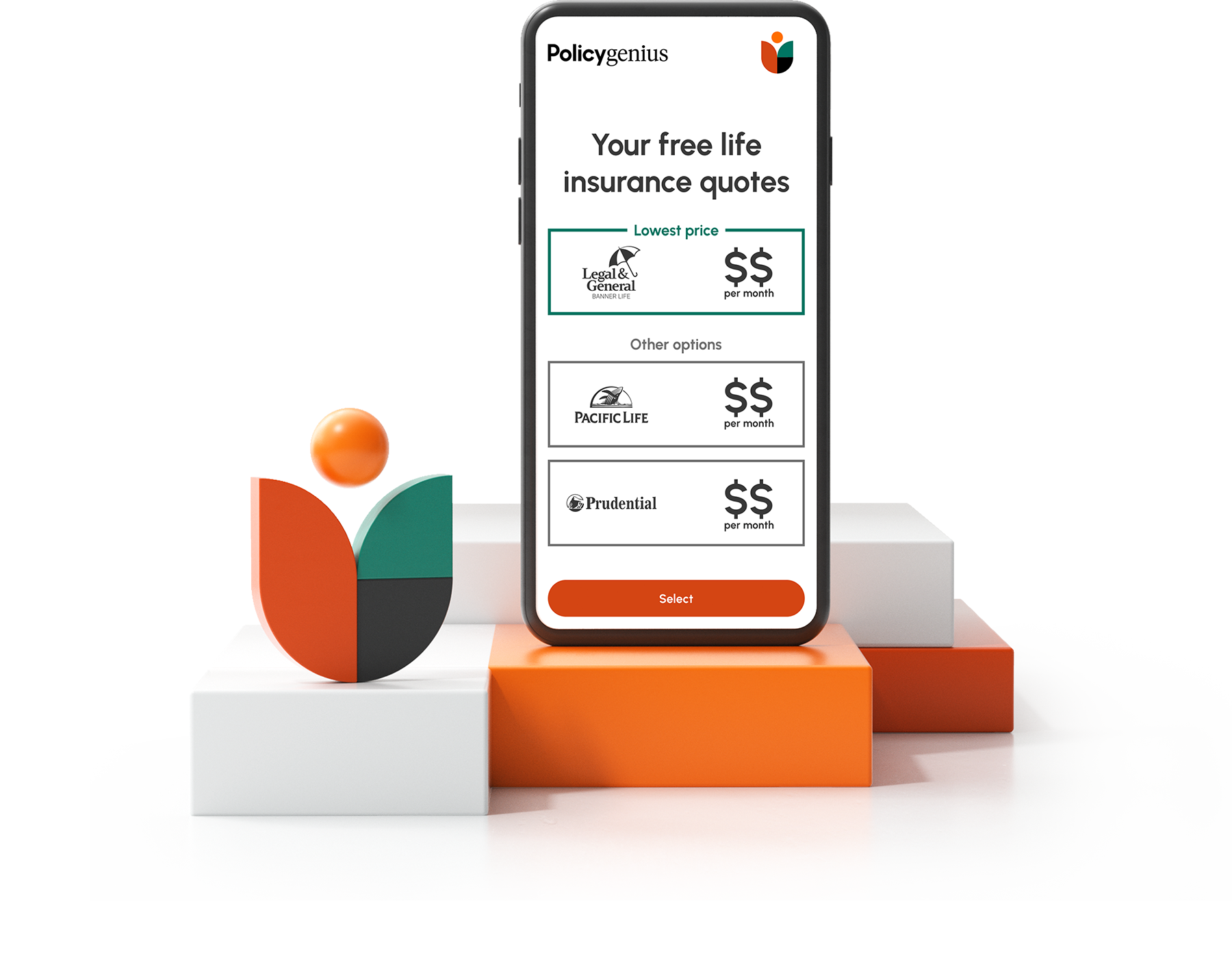What is a life insurance quote?
A life insurance quote is an estimate of how much you’ll pay for a policy based on your age, income, health history, and other factors. Every insurance company calculates quotes differently, so cost estimates can vary widely.
Comparing quotes from multiple life insurance companies is the best way to find the most affordable policy that meets your needs. Due to federal regulations, no company, broker, or agent can offer you a discount on life insurance — but since each insurer calculates risk differently, the cost you pay will be cheaper with some companies and more expensive with others.
How to compare life insurance quotes
1. Decide where to get life insurance quotes
You can choose between three options for comparing quotes.
Online marketplaces like Policygenius let you compare life insurance quotes from multiple companies, find the most affordable option that meets your coverage needs, and purchase a policy for no extra charge.
Independent agents or brokers will usually let you compare quotes from any of the insurance companies they represent, though they may also charge a fee for their services.
Captive agents only work for a single insurance company. If you want to compare quotes from multiple insurance companies, you'll have to reach out to a captive agent at each individual company, which can be time-consuming.
If you prefer purchasing life insurance in-person, a local independent agent or broker is could be a great fit. But if you're comfortable comparing quotes online and speaking with a licensed agent over the phone, we recommend getting life insurance quotes through our online marketplace at Policygenius since it's faster, easier, and often more affordable.
2. Consider what type of life insurance you need
The best type of life insurance for you depends on your age, your budget, your insurance goals and needs, and many other factors.
The two main types of life insurance are term and permanent. Term life insurance covers you for a set period of time — usually between 10 and 30 years. Permanent life insurance can cover you for your entire life, and some of these products can come with a cash value savings component, which can grow tax-deferred over time.
Many people purchase both term and permanent policies: a term policy to cover the most expensive years of their lives, plus a smaller permanent policy for lifelong coverage and additional benefits. In fact, some insurers now offer hybrid policies that combine certain benefits of term and permanent life insurance together into a single product.
At Policygenius, our agents can help you compare policy types and apply for the right coverage at a price that works for you.
3. Determine how much life insurance you need
One easy rule of thumb is that your life insurance plan should include coverage that’s roughly 10 to 15 times your annual income. For example, if you make $100,000 per year, you’ll likely need around $1 million to $1.5 million in life insurance coverage.
Our life insurance calculator can help you estimate how much money your family would need to replace the loss of your income and meet their future goals.
When comparing life insurance quotes, consider all the expenses your family has now and will have in the future, such as:
Everyday living expenses
Mortgage payments
Your children’s educational costs
The cost of your own funeral
Your life insurance policy amount should cover them all, so your loved ones won’t struggle financially in your absence.
When to get life insurance
Many people buy a life insurance policy after a major life event like getting married, having children, or buying a house, in order to financially protect their dependents in the event of their death.
When you get married: If you have a spouse or other family members in your household who are dependent on your income, it’s important to have life insurance to protect their quality of life.
When you have or adopt children: After growing your family, it’s smart to evaluate your life insurance coverage to make sure your children are protected.
When you buy a home: A mortgage is often the largest financial obligation a homeowner will leave behind in the event of their death.
When you have aging parents: If you have older dependents or expect to care for an aging family member, life insurance can help make sure their care doesn’t lapse in your absence.
When you start a business: Life insurance can help your business partners pay estate taxes, buy out a partner, or hire a replacement if you die.
When you’re a young adult: Even if you don’t have any dependents yet, getting life insurance while young might be a smart move because that’s when it’ll be the cheapest. You can start planning for the future now and save money by locking in the cheapest rates.
When you’re over 60 years of age: Seniors can use life insurance to cover final expenses or to complement their estate planning strategy.
How to find the best life insurance company for you
Our independent, unbiased ratings and reviews of the best life insurance companies will help you find a great life insurance policy with confidence. The right life insurance company for you will depend on factors like your age, health, and financial needs.
You can also explore our reviews of more than 30 life insurance companies so that you'll know more about each insurer when you're getting quotes in our marketplace.
Insurer | Policygenius rating | Best for | AM Best rating | |
|---|---|---|---|---|
4.9/5 ★ | Affordability, term life, smokers | A+ | ||
4.9/5 ★ | Whole life | A++ | ||
4.8/5 ★ | Pre-existing conditions | A | ||
4.8/5 ★ | Customer satisfaction | A+ |
How much will your life insurance cost?
In general, the younger and healthier you are, the cheaper your life insurance will be. A healthy 30-year-old who doesn’t smoke pays $26 per month on average for a 20-year term life policy with a $500,000 payout. The same person could expect to pay around $450 per month for a whole life policy with an identical payout.
Learn more about life insurance rates�
What factors affect life insurance quotes and rates?
Age: The younger you are, the lower your premium payments will be. Life insurance rates typically go up between 4.5% and 9.2% every year you age, since we all become riskier to insure as we grow older.
Gender: Women pay an average of 24% less for life insurance than men. Since women often live longer than men, covering women presents less risk to an insurance company.
Health: Serious health conditions can lead to high rates or denied coverage. Mild conditions may have a small impact on the cost of your premiums.
Lifestyle: Insurance companies consider some hobbies — like skydiving or scuba diving past a certain depth — risky enough to increase the cost of your life insurance policy.





